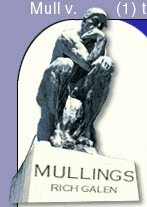|
|

|

Become a
Paid Mullings Subscriber!
(To join the FREE mailing list or to unsubscribe Click Here)
Managing an Expanding Majority
Rich Galen Monday January 24, 2005
Last week I did a 10 minute segment on BBC World Service radio on the problems of the Republican Party in the United States.
I noted that the Democrats would love to have any of the problems which the presenter was attributing to the GOP including the problem of how to deal with an expanding majority.
The two-party political system which dominates US politics exists because of tradition. There is nothing in the Constitution which even speaks to political parties, much less limits the number.
You and I could start a new political party if we wanted to. Nothing prevents us. State legislatures have, over the decades, made it very difficult for candidates not aligned with one of the two major parties to get on the ballot, but it can be done.
Most recently Ross Perot and Ralph Nader have shown that so-called "Third Party" candidates can qualify for the ballot, but it takes an enormous effort.
I go through all this because in America, when one party begins to dominate - as the Republican party is at this point in history - the edges of that Party get farther and farther apart.
After Watergate in the mid-70's, you could go to almost any county GOP central committee meeting in the country and find the seven people who had shown up pretty much agreed with each other on most issues.
The Reagan Revolution firmly established the base of the Republican party. The party was stronger and became comfortable with its identity.
Nevertheless, Democrats continued to control the US House. The US Senate which switched to Republican control in the election of 1980, switched back as many of the "Reagan Babies" who had swept in on Reagan's coattails, were swept back out in 1986 when their six-year terms came to an end.
The GOP continued to expand as the message of the Democratic party, which relied largely on the diminishing reverberations of 1930's class struggle as delivered by children of the 1960's, sounded strange and strained to late 20th century ears which were 50 years removed from the Great Depression and 25 years beyond the height of the civil rights movement.
In addition, the prime voting-age population moving from North to South led to victories in state house and state senate seats. GOP victories in state legislatures led to redrawing of Congressional District lines. Redrawing of Congressional District lines allowed Newt Gingrich to convince the country that Republicans could take control of the US House which, in the election of 1994, came to pass.
The challenge of the Republican Party leadership now is to manage a coalition which extends from cultural conservatives on the right to social moderates on the left. The White House, the Republican National Committee, and each state GOP organization must find ways to remind Republicans of the many issues on which they agree - and on which they disagree with Democrats - and diffuse the real policy differences which exist between the edges of the party on the left and the right.
The Democratic Party is entirely self-absorbed in trying to find some path they can follow to get out of the political swamp in which it finds itself. Until the Dems get themselves aimed in some common direction, they are in no position to exploit a GOP in transition to a true majority party.
It appears likely that the Democrats will elect Howard Dean to be its chairman. But because Dean is not of the Washington establishment, it is not unlikely that the Congressional Democrats will demand the appointment of a "General Chairman" who will protect their interests.
The Democratic party is shrinking. At the end of that process the true identity of the party will be distilled. Those who are comfortable with where that puts the Democratic party along the American political continuum will join up.
If that number gets large enough, the Democratic party will, at some point in the future, find itself with the problem - the happy problem - with which the GOP finds itself now: Managing an expanding majority.
On the Secret Decoder Ring page today: A link to Newsweek's coverage of the Democrats' attempts to determine its leadership; a pretty cool Mullfoto; and a good night to Johnny Carson.
--END --
Copyright © 2005 Richard A. Galen
Current Issue |
Secret Decoder
Ring | Past
Issues | Email
Rich | Rich
Who?
Copyright �2002 Richard
A. Galen | Site design by Campaign
Solutions. | |
|
